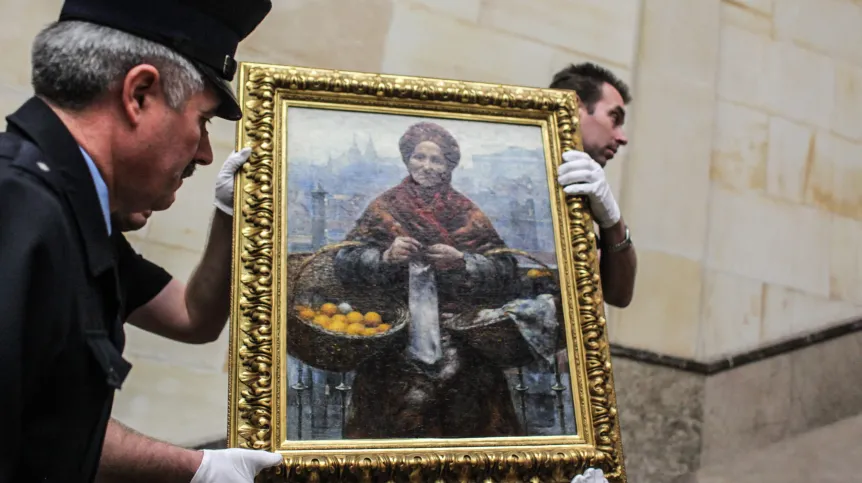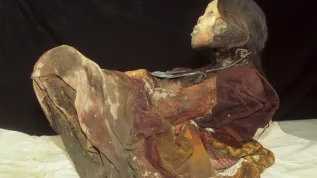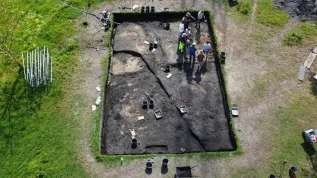
Warfare creates conditions for smuggling works of art and destruction of cultural heritage. In Ukraine, Syria, Iraq and other countries affected by the consequences of armed conflicts, the risks of illegal exports of cultural goods is high. Polish researchers from the UNESCO Chair on Cultural Property Law in Opole promote and regulate a conscious art market.
Trafficking in cultural goods
The researchers are working on the issue of 'due diligence', which means a set of legal provisions and good practices that determine how to proceed when acquiring cultural property, such as paintings, sculptures, or archaeological artefacts.
“In most cases, cultural property is smuggled from countries where illegal excavations or military activities are taking place. Ukraine is currently at risk of illicit art trafficking. In addition, cultural heritage, including monuments collected in and outside of museums, is being destroyed by the aggressor in the country. A similar situation affects Iraq, Syria,” says Dr. Jagielska-Burduk, Secretary General of the Polish Committee for UNESCO.
The head of the UNESCO Chair on Cultural Property Law at the University of Opole, her team deals with the issues of illegal trade in relics related to the war in Ukraine. The Chair was established in 2018 to address the issue of movable cultural property, its trade, and threats to monuments due to illegal trafficking and illegal excavations, among other things. Currently, the researchers are working on the possibilities of using connections between various UNESCO culture conventions to strengthen the cultural heritage protection system.
Scientists cannot comment on the trafficking channels, but science can actively counteract this practice by developing law and promoting legal knowledge.
In January, in collaboration with the National Heritage Institute, UNESCO organized a training on counteracting illegal trade and smuggling of cultural goods in connection with Russia's aggression against Ukraine. The workshop was attended by representatives of the UNESCO Chair on Cultural Property Law in Opole.
The Polish team consists of experts in EU law, administrative law, European law, and constitutional law. Students and experts from Croatia and Spain, as well as from other UNESCO Chairs, including Geneva, Sydney, and Beijing, are also involved in the protection of cultural goods. Joining the network brings numerous prestigious benefits and the opportunity to collaborate with all other universities worldwide that deal with similar topics.
Conscious art market
Researchers aim to raise awareness associated with participation in transactions in the art market.
“When travelling abroad, we often buy souvenirs. A conscious market participant certainly avoids situations where they could buy antiques that should not leave their home country. Due diligence requires verifying the provenance of, for example, paintings in special databases, such as Interpol databases, databases maintained by private entities, and the International Council of Museums Red Lists of cultural objects that can be subjected to theft and traffic,” says Dr. Jagielska-Burduk.
The expert explains that investments in cultural goods are being made to diversify investment portfolios. Buyers must ensure that they are not purchasing a stolen or illegally obtained object. The same due diligence applies to intermediaries, gallery owners and auction houses.
Polish scientists participate in the international debate on the model of due diligence in the trade of cultural goods. Cooperation in this area requires numerous compromises. According to Dr. Jagielska-Burduk, some countries expect strict export regulations in order to protect their national cultural heritage, while others, so-called importers, want the regulations to allow for the largest possible number of cultural objects to be brought to the market.
“A conflict of interests does not have to exit between the protection of cultural goods and the market. A conscious cultural goods market does not exclude protection, but rather assumes it,” says Jagielska-Burduk.
Promoting heritage protection law
In collaboration with universities in Gdańsk and Poznań, the Chair in Opole co-organizes an annual cultural heritage seminar in Lubostroń for young researchers, students, doctoral candidates and young scientists. The 10th edition will be organised this year. It will be attended by lawyers, historians, art historians, economists and heritage conservators.
“The meeting is interdisciplinary because the art market is complex. Young researchers who participate in the seminar can publish their papers in the 'Debuts' section of the journalSantander Art and Culture Law Review, which deals with legal aspects of culture and art,” Jagielska-Burduk says.
The invitation to the seminar is published every year on Facebook. The public event has been held in a hybrid format since the COVID-19 pandemic. The seminar facilitates contacts between young researchers and people with recognized scientific achievements.
PAP - Science in Poland, Karolina Duszczyk
kol/ zan/ kap/
tr. RL













